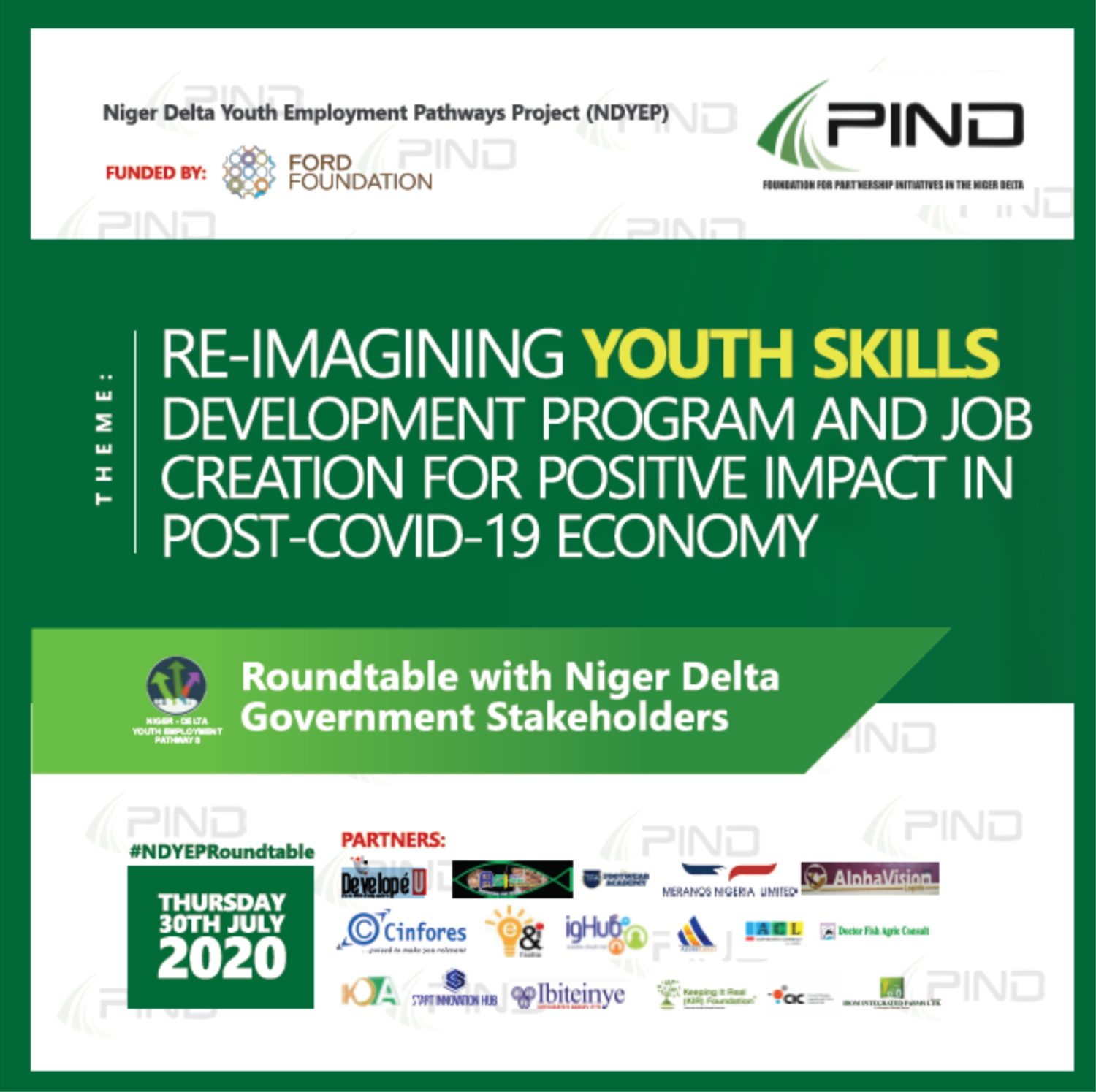Roundtable Overview
The Government Stakeholder Engagement on Skills for Youth Employment in the Niger Delta is organized by PIND Foundation under the NDYEP project. This Roundtable will bring together representatives (Commissioners, Permanent Secretaries, and Directors) of MDAs engaged with in the nine Niger Delta States that can influence and catalyze youth skills development towards youth employment and employability in their States. It will also feature representatives from the private sector, international development organizations, project advisory committee members and implementing partners, media and PIND staff as key stakeholders of the project.
Theme
Re-imagining Youth Skills Development Program and Job Creation for Positive Impact
Goal
State Governments’ adoption of the NDYEP model for demand driven job creation programming
Objectives
- Create awareness on the NDYEP model and approaches towards youth skills development.
- Build knowledge and understanding on current approaches towards youth skills development; and on regional actions to address the post-COVID19 youth employment dynamics.
- Obtain commitment by States in the region to adopt/adapt more demand led youth employment models similar to NDYEP
Panel Sessions
- States Panel Session
– NDYEP Implementing Partners and trainees share their successes and key learnings on the project.
– The peer-to-peer States learning on their current approaches to youth skills development towards employment, the emerging approaches being explored in increasing youth employment opportunities post-Covid and their commitments in adopting/adapting a more demand led youth employment model.
- Stakeholder buy-in – to share on the need for a more strengthened regional collaborative effort between States towards the adoption and/or adaption of NDYEP practices and ultimately concerted determinations in tackling youth unemployment in the Niger Delta.
Roundtable Context
Addressing youth unemployment challenge requires a multipronged, long-term effort involving multiple stakeholders, such as governments, employers, educational institutions and civil-society organizations – as well as families, communities and peer groups. Public Private Partnerships which refer to projects or programs run between government and private sector, Non-Government Organizations (NGOs) and the private sector or all the three combined have the potential to address youth unemployment than a single actor can do because as partnerships they leverage on each other’s resources, each contributes its expertise and they also share costs and benefits. In addition, partnering with the private and/or NGO sector in youth training and employment initiatives allows the private sector to participate in the formulation of training policies that meet market demands. This ensures that skills attained from the education and training facilities reflect the actual or future needs in the job market. Therefore with strengthened partnerships, skills development and youth unemployment crisis can be significantly addressed. Combining the strength of international organizations, governments, and the private sector can really make a difference.
From the 11 – 26 February 2020, PIND had a learning forum with 7 Niger Delta State government MDAs comprising of the Ministry of Youth, Economic Planning, Industry, Commerce, Education, Agriculture, Science and Technology, Women Affairs, Information and Communications, Microfinance Enterprise Development Agency, Edo and Delta Job Creation Agencies. The meetings showcased NDYEP model and framework with discussions around States youth focused programs and employment plans; possible areas of alignment of States current model with NDYEP’s and areas for technical support towards an adoption or adaptation of NDYEP’s practices. At the end of each State meeting, representatives expressed their interest to work with PIND to implement the demand-led model in their respective government programs. Hence, this Roundtable is informed on the engagements with States to collate decisions and a more targeted and robust platform to further deepen government adoption and of practices.




